
Alexander III of Macedon, commonly known as Alexander the Great, was a king (basileus) of the ancient Greek kingdom of Macedon and a member of the Argead dynasty. He was born in Pella in 356 BC and succeeded his father Philip II to the throne at the age of 20. He spent most of his ruling years on an unprecedented military campaign through Asia and northeast Africa, and he created one of the largest empires of the ancient world by the age of thirty, stretching from Greece to northwestern India. He was undefeated in battle and is widely considered one of history's most successful military commanders.

Alexander III was the Emperor of Russia, King of Poland, and Grand Duke of Finland from 13 March [O.S. 1 March] 1881 until his death on 1 November [O.S. 20 October] 1894. He was highly conservative and reversed some of the liberal reforms of his father, Alexander II. During Alexander's reign Russia fought no major wars, and he was therefore styled "The Peacemaker".

Field Marshal Harold Rupert Leofric George Alexander, 1st Earl Alexander of Tunis, was a senior British Army officer who served with distinction in both the First World War and the Second World War and, afterwards, as Governor General of Canada, the 17th since Canadian Confederation.

Alexander Hamilton was an American statesman and one of the Founding Fathers of the United States. He was an influential interpreter and promoter of the U.S. Constitution, as well as the founder of the nation's financial system, the Federalist Party, the United States Coast Guard, and the New York Post newspaper. As the first Secretary of the Treasury, Hamilton was the main author of the economic policies of George Washington's administration. He took the lead in the Federal government's funding of the states' debts, as well as establishing a national bank, a system of tariffs, and friendly trade relations with Britain. His vision included a strong central government led by a vigorous executive branch, a strong commercial economy, a national bank and support for manufacturing, and a strong military. Thomas Jefferson was his leading opponent, arguing for agrarianism and smaller government.

Willem-Alexander is the King of the Netherlands, having ascended the throne following his mother's abdication in 2013.

Queen Máxima of the Netherlands is the wife of King Willem-Alexander. On 30 April 2013, she became the first queen consort of the Netherlands since Emma of Waldeck and Pyrmont and the first Latin American-born queen consort in the history of the Netherlands.

St. Alexander Yaroslavich Nevsky served as Prince of Novgorod, Grand Prince of Kiev (1236–52) and Grand Prince of Vladimir (1252–63) during some of the most difficult times in Kievan Rus' history.

Alexander IV, erroneously called sometimes in modern times Aegus, was the son of Alexander the Great and Princess Roxana of Bactria.

The Most Distinguished Order of Saint Michael and Saint George is a British order of chivalry founded on 28 April 1818 by George, Prince Regent, later King George IV, while he was acting as regent for his father, King George III.
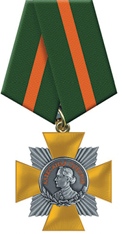
The Order of Suvorov is a military decoration of the Russian Federation named in honor of Russian Field Marshal Count Alexander Suvorov (1729–1800).

The Order of Friendship of Peoples was an order of the Soviet Union, and was awarded to persons, organizations, enterprises, military units, as well as administrative subdivisions of the USSR for accomplishments in strengthening of inter-ethnic and international friendship and cooperation, for economical, political, scientific, military, and cultural development of the Soviet Union.
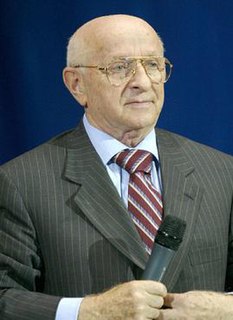
Alexander Yakovlevich Gomelsky was a Soviet and Russian professional basketball coach. The father of Soviet and Russian basketball, he was inducted into the Naismith Memorial Basketball Hall of Fame in 1995 and the FIBA Hall of Fame in 2007.

The Order of Alexander Nevsky is an order of merit of the Russian Federation named in honour of saint Alexander Nevsky (1220–1263) and bestowed to civil servants for twenty years or more of highly meritorious service. It was originally established by the Soviet Union as a military honour during World War II, more precisely by Decree of the Presidium of the Supreme Soviet of the USSR of July 7, 1942. Its statute was amended by Decree of the Presidium of the Supreme Soviet of the USSR of February 26, 1947. It bears a similar name to the Imperial Order of St. Alexander Nevsky which had been established by Empress Catherine I of Russia in 1725, and continued to be bestowed by the heads of the House of Romanov after the 1917 Russian Revolution. The Order of Alexander Nevsky was reinstated by the Soviet Union, minus the words "Imperial" and "Saint", for award to officers of the army for personal courage and resolute leadership. The Order was retained by the new Russian Federation following the dissolution of the USSR by Decision of the Supreme Soviet of the Russian Federation 2557-I of March 20, 1992 but was never awarded. The September 7, 2010 Decree №1099 of the President of the Russian Federation redesigned the badge of the Order closer to pre-1917 imperial model and amended the statute of the Order making it a purely civilian award.
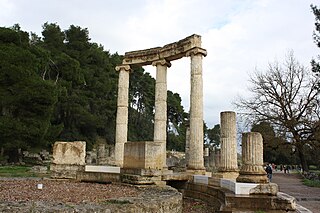
The Philippeion in the Altis of Olympia was an Ionic circular memorial in limestone and marble, a tholos, which contained chryselephantine statues of Philip's family; himself, Alexander the Great, Olympias, Amyntas III and Eurydice I. It was made by the Athenian sculptor Leochares in celebration of Philip's victory at the battle of Chaeronea. It was the only structure inside the Altis dedicated to a human.

The Imperial Order of Saint Alexander Nevsky was an order of chivalry of the Russian Empire first awarded on 1 June [O.S. 21 May] 1725 by Empress Catherine I of Russia.

The Yugoslav monarchy was abolished by the then-ruling Communist regime on 29 December 1945, on the second anniversary of the Second Session of the AVNOJ.
Jason "Jace" Alexander is an American television director and actor from New York City.
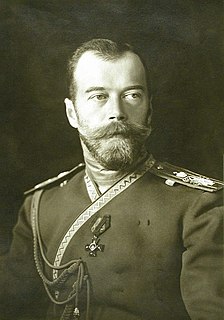
Nicholas II or Nikolai II, known as Saint Nicholas the Passion-Bearer in the Russian Orthodox Church, was the last Emperor of Russia, ruling from 1 November 1894 until his forced abdication on 15 March 1917. His reign saw the fall of the Russian Empire from one of the foremost great powers of the world to economic and military collapse. He was given the nickname Nicholas the Bloody or Vile Nicholas by his political adversaries due to the Khodynka Tragedy, anti-Semitic pogroms, Bloody Sunday, the violent suppression of the 1905 Russian Revolution, the execution of political opponents, and his perceived responsibility for the Russo-Japanese War (1904–1905). Soviet historians portrayed Nicholas as a weak and incompetent leader whose decisions led to military defeats and the deaths of millions of his subjects.
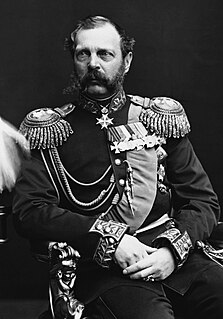
Alexander II was the Emperor of Russia from 2 March 1855 until his assassination on 13 March 1881. He was also the King of Poland and the Grand Duke of Finland.






















